Jesus and the Gospels Lesson 3
Mark II
Mike Ervin
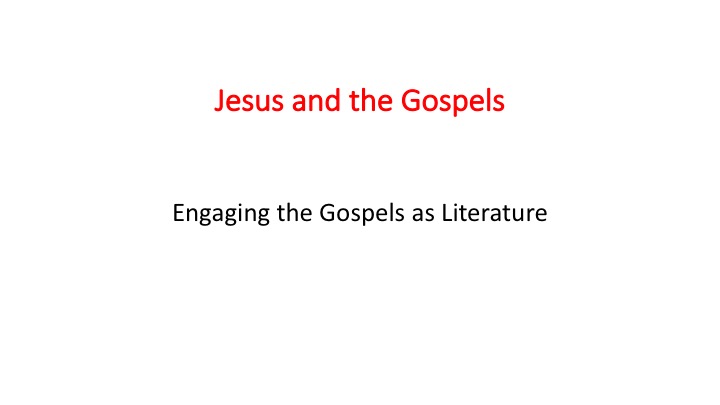
Jesus and the Gospels
Engaging the Gospels as Literature
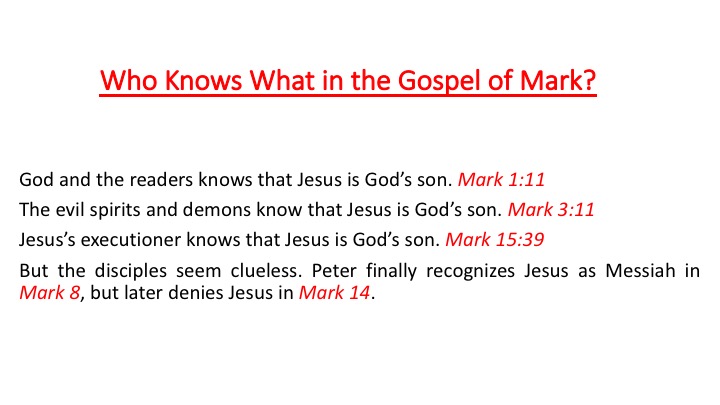
Who Knows What in the Gospel of Mark?
Last week we ended our slides with a little teaser (shown above and listed below). It pointed out that almost everyone, including the reader of Mark, knew that Jesus was the Son of God. But the disciples seemed clueless about that. This aspect of Mark distinguishes the Gospel of Mark from the other Gospels. So it raises a fundamental question for scholars - "Why did Mark present the disciples in that manner. Was it purposeful and what was the purpose?
We will explore that today.
God and the readers knows that Jesus is God’s son. Mark 1:11
The evil spirits and demons know that Jesus is God’s son. Mark 3:11
Jesus’s executioner knows that Jesus is God’s son. Mark 15:39
But the disciples seem clueless. Peter finally recognizes Jesus as Messiah in Mark 8, but later denies Jesus in Mark 14.
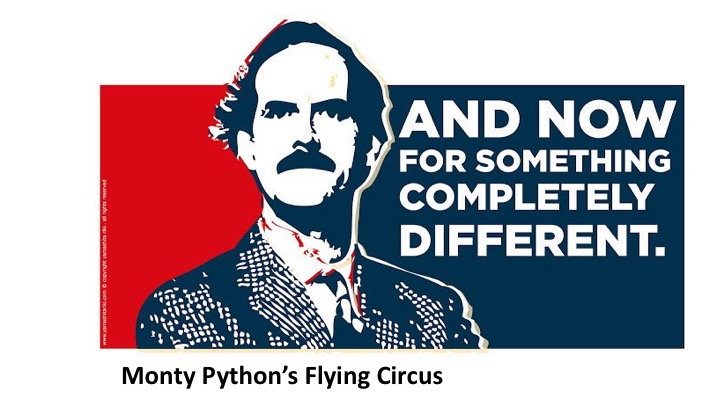
So today we are going to do something completely different. We are going to assume Mark was very purposeful in doing this, and we are going to read through Mark to see how he laid out his arguments for this. And do a little speculating on why he choose to to do this.
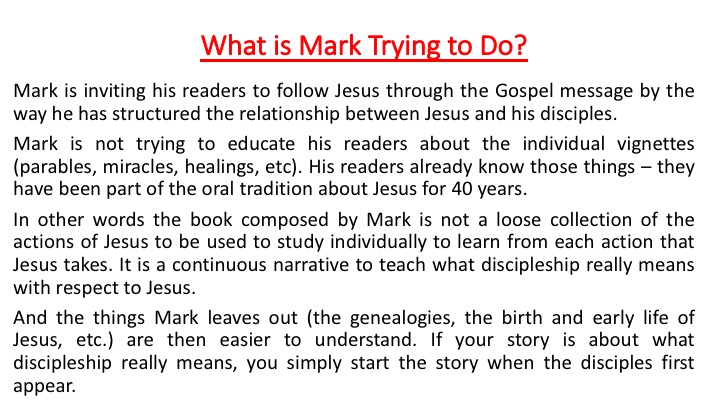
Mark is inviting his readers to follow Jesus through the Gospel message by the way he has structured the relationship between Jesus and his disciples.
Mark is not trying to educate his readers about the individual vignettes (parables, miracles, healings, etc). His readers already know those things – they have been part of the oral tradition about Jesus for 40 years.
In other words the book composed by Mark is not a loose collection of the actions of Jesus to be used to study individually to learn from each action that Jesus takes. It is a continuous narrative to teach what discipleship really means with respect to Jesus. It is a primer on what discipleship really means with respect to Jesus.
And the things Mark leaves out (the genealogies, the birth and early life of Jesus, etc.) are then easier to understand. If your story is about what discipleship really means, you simply start the story when the disciples first appear.
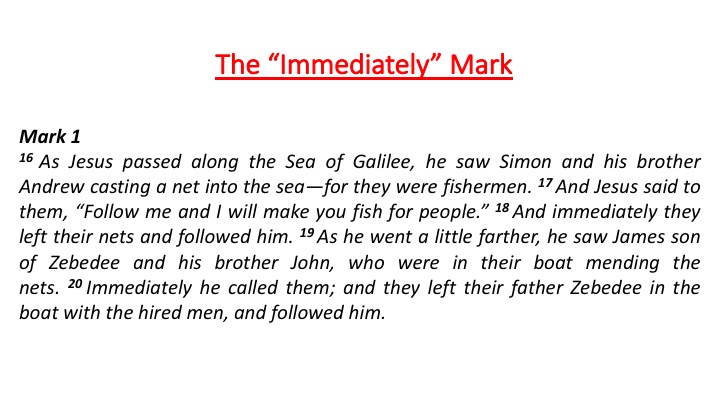
So we begin in the first chapter of Mark and we will read forward from there. And fittingly, since this is about discipleship almost immediately come to the initial recruitment of the first disciples.
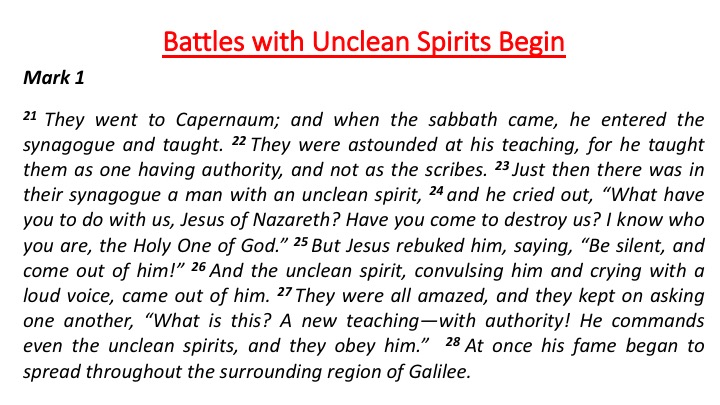
Jesus and the Gospels
Battles with Unclean Spirits Begin
Mark 1
21 They went to Capernaum; and when the sabbath came, he entered the synagogue and taught. 22 They were astounded at his teaching, for he taught them as one having authority, and not as the scribes. 23 Just then there was in their synagogue a man with an unclean spirit, 24 and he cried out, “What have you to do with us, Jesus of Nazareth? Have you come to destroy us? I know who you are, the Holy One of God.” 25 But Jesus rebuked him, saying, “Be silent, and come out of him!” 26 And the unclean spirit, convulsing him and crying with a loud voice, came out of him. 27 They were all amazed, and they kept on asking one another, “What is this? A new teaching—with authority! He commands even the unclean spirits, and they obey him.”

Ongoing Healing Miracles and Exorcisms
Mark 1
29 As soon as they left the synagogue, they entered the house of Simon and Andrew, with James and John. 30 Now Simon’s mother-in-law was in bed with a fever, and they told him about her at once. 31 He came and took her by the hand and lifted her up. Then the fever left her, and she began to serve them.
32 That evening, at sunset, they brought to him all who were sick or possessed with demons. 33 And the whole city was gathered around the door. 34 And he cured many who were sick with various diseases, and cast out many demons; and he would not permit the demons to speak, because they all knew him.
Mark again reminds us that the demons knew that Jesus was the Son of God. Not so the disciples.
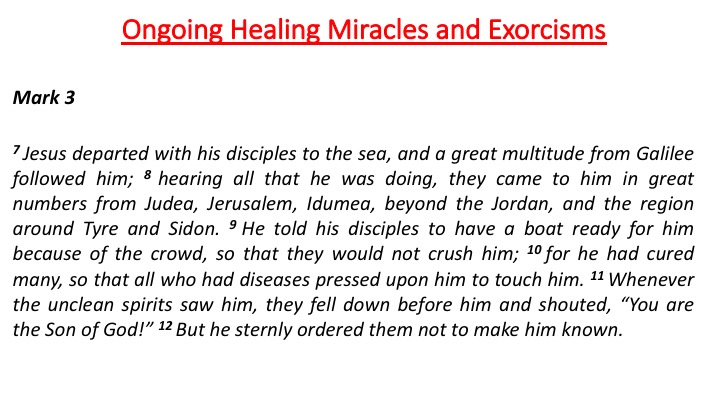
Ongoing Healing Miracles and Exorcisms
Mark 3
7 Jesus departed with his disciples to the sea, and a great multitude from Galilee followed him; 8 hearing all that he was doing, they came to him in great numbers from Judea, Jerusalem, Idumea, beyond the Jordan, and the region around Tyre and Sidon. 9 He told his disciples to have a boat ready for him because of the crowd, so that they would not crush him; 10 for he had cured many, so that all who had diseases pressed upon him to touch him. 11 Whenever the unclean spirits saw him, they fell down before him and shouted, “You are the Son of God!” 12 But he sternly ordered them not to make him known.
And again reminds us (authorial comment) that only the unclean spirits knew Jesus.
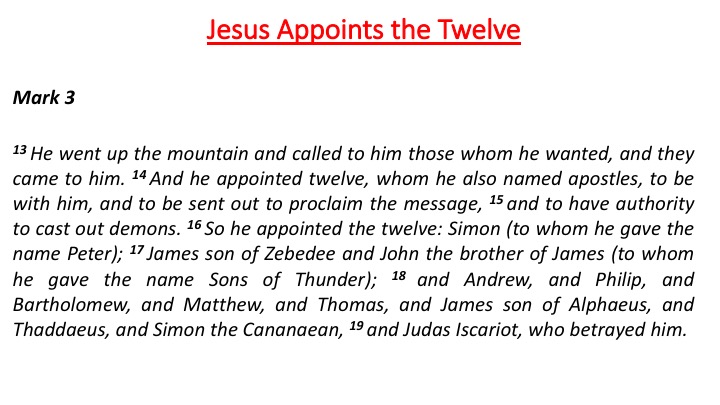
Jesus and the Gospels
Jesus Appoints the Twelve
Mark 3
13 He went up the mountain and called to him those whom he wanted, and they came to him. 14 And he appointed twelve, whom he also named apostles, to be with him, and to be sent out to proclaim the message, 15 and to have authority to cast out demons. 16 So he appointed the twelve: Simon (to whom he gave the name Peter); 17 James son of Zebedee and John the brother of James (to whom he gave the name Sons of Thunder); 18 and Andrew, and Philip, and Bartholomew, and Matthew, and Thomas, and James son of Alphaeus, and Thaddaeus, and Simon the Cananaean, 19 and Judas Iscariot, who betrayed him.
Note that Jesus appointed them (1) to be with him, (2) to proclaim his message, and (3) to have the authority to cast out demons. There is little evidence in Mark that they did a great job at any of those things.
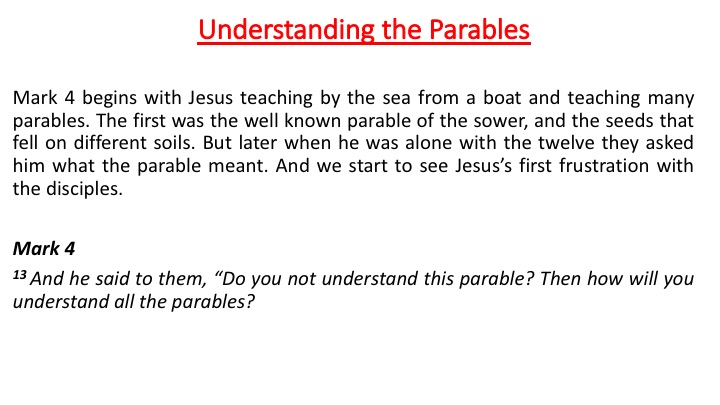
Jesus and the Gospels
Understanding the Parables
Mark 4 begins with Jesus teaching by the sea from a boat and teaching many parables. The first was the well known parable of the sower, and the seeds that fell on different soils. But later when he was alone with the twelve they asked him what the parable meant. And we start to see Jesus’s first frustration with the disciples.
Mark 4
13 And he said to them, “Do you not understand this parable? Then how will you understand all the parables?
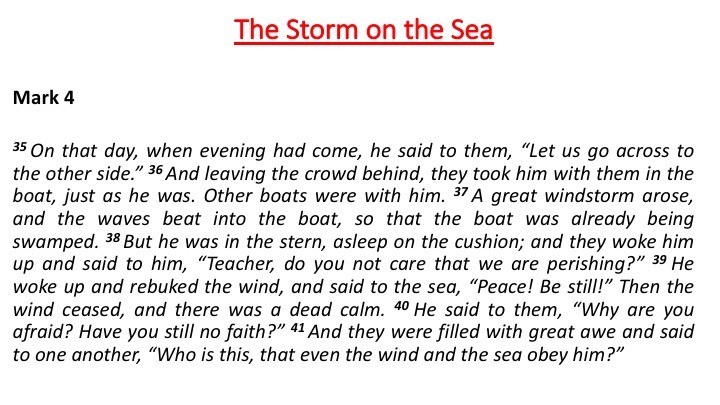
The Storm on the Sea
Mark 4
35 On that day, when evening had come, he said to them, “Let us go across to the other side.” 36 And leaving the crowd behind, they took him with them in the boat, just as he was. Other boats were with him. 37 A great windstorm arose, and the waves beat into the boat, so that the boat was already being swamped. 38 But he was in the stern, asleep on the cushion; and they woke him up and said to him, “Teacher, do you not care that we are perishing?” 39 He woke up and rebuked the wind, and said to the sea, “Peace! Be still!” Then the wind ceased, and there was a dead calm. 40 He said to them, “Why are you afraid? Have you still no faith?” 41 And they were filled with great awe and said to one another, “Who is this, that even the wind and the sea obey him?”
Mark tells us again that they were in great awe of Jesus but still questioned who he was.
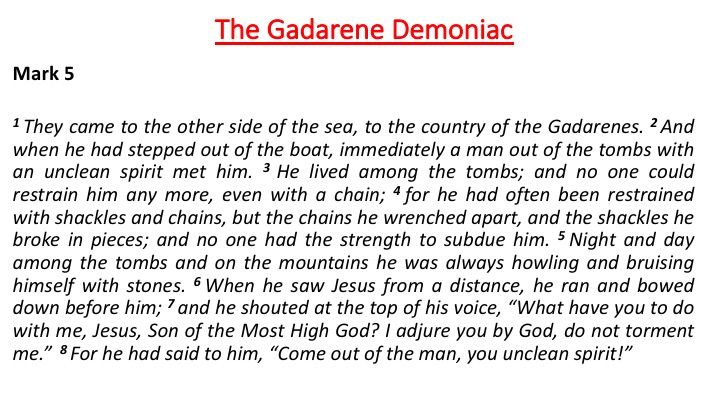
The Gadarene Demoniac
Mark 5
1 They came to the other side of the sea, to the country of the Gadarenes. 2 And when he had stepped out of the boat, immediately a man out of the tombs with an unclean spirit met him. 3 He lived among the tombs; and no one could restrain him any more, even with a chain; 4 for he had often been restrained with shackles and chains, but the chains he wrenched apart, and the shackles he broke in pieces; and no one had the strength to subdue him. 5 Night and day among the tombs and on the mountains he was always howling and bruising himself with stones. 6 When he saw Jesus from a distance, he ran and bowed down before him; 7 and he shouted at the top of his voice, “What have you to do with me, Jesus, Son of the Most High God? I adjure you by God, do not torment me.” 8 For he had said to him, “Come out of the man, you unclean spirit!”
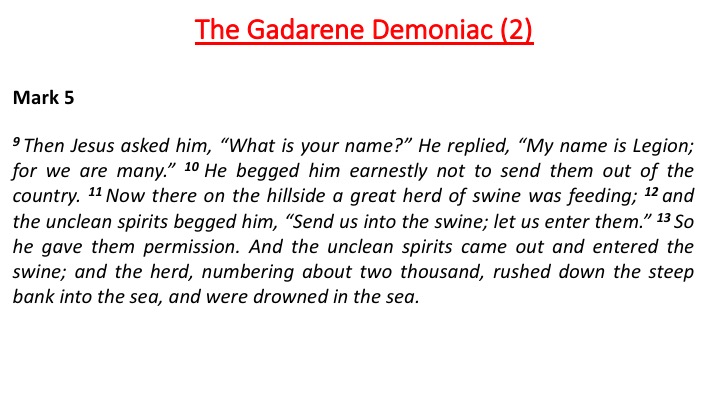
The Gadarene Demoniac (2)
Mark 5
9 Then Jesus asked him, “What is your name?” He replied, “My name is Legion; for we are many.” 10 He begged him earnestly not to send them out of the country. 11 Now there on the hillside a great herd of swine was feeding; 12 and the unclean spirits begged him, “Send us into the swine; let us enter them.” 13 So he gave them permission. And the unclean spirits came out and entered the swine; and the herd, numbering about two thousand, rushed down the steep bank into the sea, and were drowned in the sea.
Another graphic example of the power exhibited by Jesus. Mark keeps ratching up the miracles.
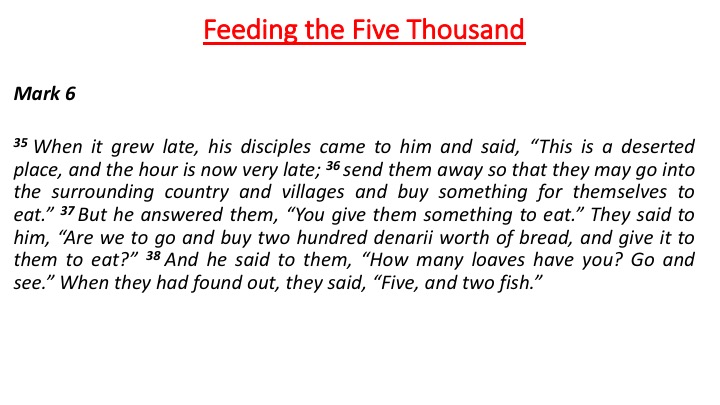
Jesus and the Gospels
Feeding the Five Thousand
Mark 6
35 When it grew late, his disciples came to him and said, “This is a deserted place, and the hour is now very late; 36 send them away so that they may go into the surrounding country and villages and buy something for themselves to eat.” 37 But he answered them, “You give them something to eat.” They said to him, “Are we to go and buy two hundred denarii[i] worth of bread, and give it to them to eat?” 38 And he said to them, “How many loaves have you? Go and see.” When they had found out, they said, “Five, and two fish.”
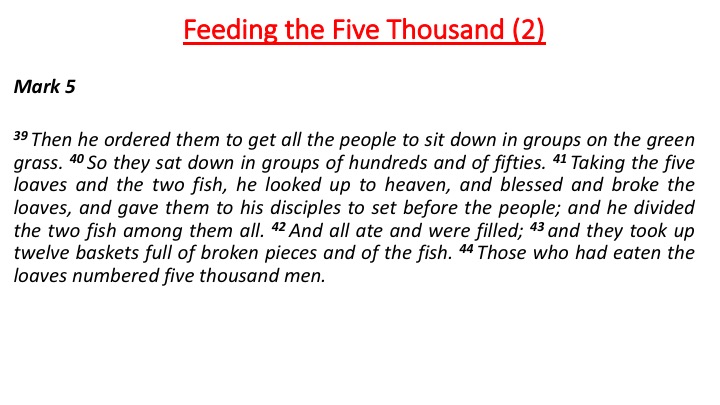
Feeding the Five Thousand
Mark 6
39 Then he ordered them to get all the people to sit down in groups on the green grass. 40 So they sat down in groups of hundreds and of fifties. 41 Taking the five loaves and the two fish, he looked up to heaven, and blessed and broke the loaves, and gave them to his disciples to set before the people; and he divided the two fish among them all. 42 And all ate and were filled; 43 and they took up twelve baskets full of broken pieces and of the fish. 44 Those who had eaten the loaves numbered five thousand men.
But as we will soon see, the disciples did not seem to comprehend that this was something an ordinary human could do. So again Mark ratchets up the miracles.
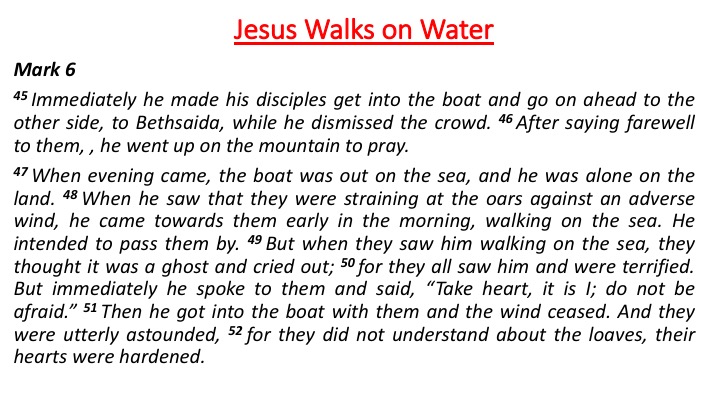
Jesus and the Gospels
Jesus Walks on Water
Mark 6
45 Immediately he made his disciples get into the boat and go on ahead to the other side, to Bethsaida, while he dismissed the crowd. 46 After saying farewell to them, he went up on the mountain to pray. 47 When evening came, the boat was out on the sea, and he was alone on the land. 48 When he saw that they were straining at the oars against an adverse wind, he came towards them early in the morning, walking on the sea. He intended to pass them by. 49 But when they saw him walking on the sea, they thought it was a ghost and cried out; 50 for they all saw him and were terrified. But immediately he spoke to them and said, “Take heart, it is I; do not be afraid.” 51 Then he got into the boat with them and the wind ceased. And they were utterly astounded, 52 for they did not understand about the loaves, their hearts were hardened.
Once again, and authorial comment. Mark turns to the reader and says that they did not understand about the loaves and their hearts were hardened.
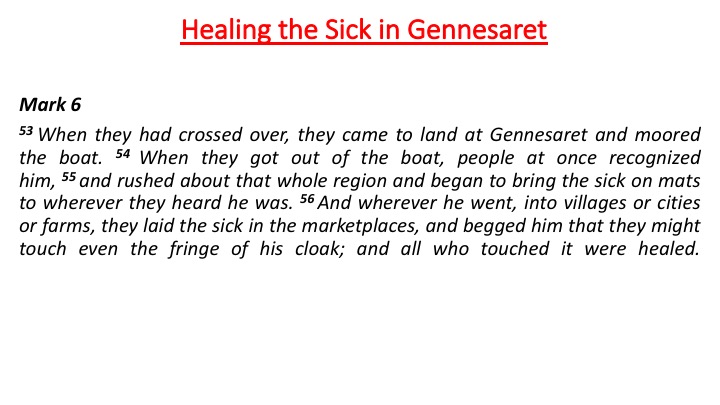
Healing the Sick in Gennesaret
Mark 6
53 When they had crossed over, they came to land at Gennesaret and moored the boat. 54 When they got out of the boat, people at once recognized him, 55 and rushed about that whole region and began to bring the sick on mats to wherever they heard he was. 56 And wherever he went, into villages or cities or farms, they laid the sick in the marketplaces, and begged him that they might touch even the fringe of his cloak; and all who touched it were healed.
Once again the disciples saw all of this - healings only from touching the cloak of Jesus
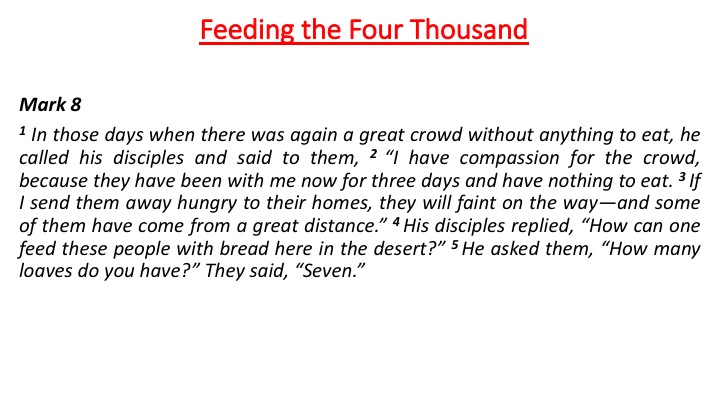
Feeding the Four Thousand
Mark 8
1 In those days when there was again a great crowd without anything to eat, he called his disciples and said to them, 2 “I have compassion for the crowd, because they have been with me now for three days and have nothing to eat. 3 If I send them away hungry to their homes, they will faint on the way—and some of them have come from a great distance.” 4 His disciples replied, “How can one feed these people with bread here in the desert?” 5 He asked them, “How many loaves do you have?” They said, “Seven.”
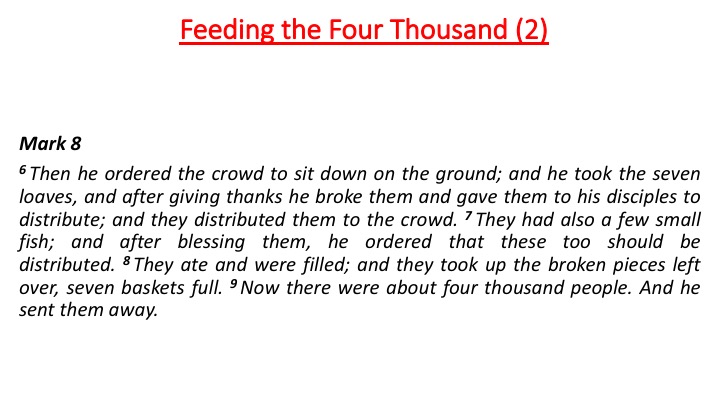
Feeding the Four Thousand
Mark 8
6 Then he ordered the crowd to sit down on the ground; and he took the seven loaves, and after giving thanks he broke them and gave them to his disciples to distribute; and they distributed them to the crowd. 7 They had also a few small fish; and after blessing them, he ordered that these too should be distributed. 8 They ate and were filled; and they took up the broken pieces left over, seven baskets full. 9 Now there were about four thousand people. And he sent them away.
And this leads into Jesus questioning the disciples about their understanding of what was going on in the feeding of huge groups of people with a very small supply of bread and fish.
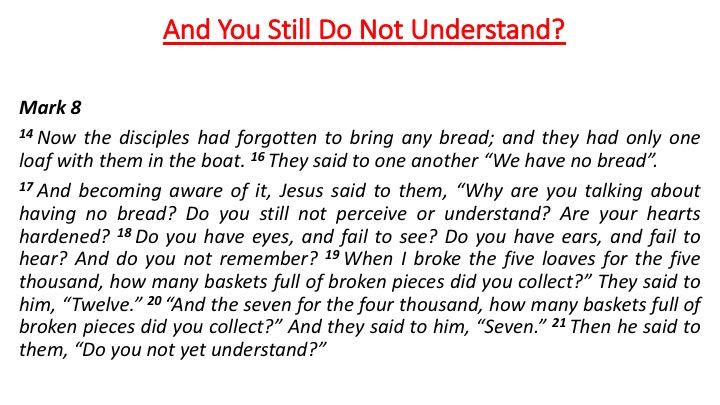
And You Still Do Not Understand?
Mark 8
14 Now the disciples had forgotten to bring any bread; and they had only one loaf with them in the boat. 16 They said to one another “We have no bread”.
17 And becoming aware of it, Jesus said to them, “Why are you talking about having no bread? Do you still not perceive or understand? Are your hearts hardened? 18 Do you have eyes, and fail to see? Do you have ears, and fail to hear? And do you not remember? 19 When I broke the five loaves for the five thousand, how many baskets full of broken pieces did you collect?” They said to him, “Twelve.” 20 “And the seven for the four thousand, how many baskets full of broken pieces did you collect?” And they said to him, “Seven.” 21 Then he said to them, “Do you not yet understand?”
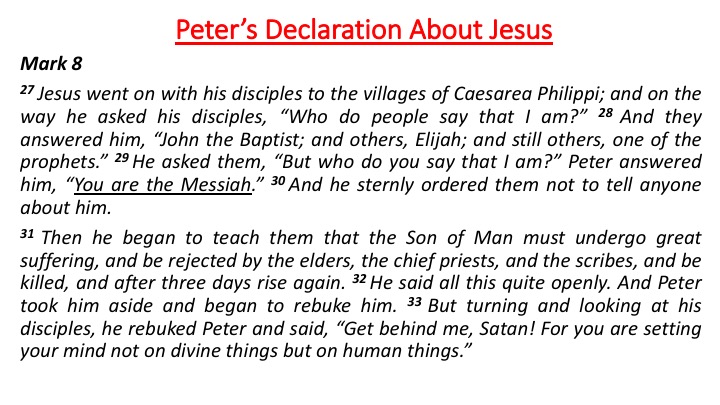
Peter’s Declaration About Jesus
Mark 8
27 Jesus went on with his disciples to the villages of Caesarea Philippi; and on the way he asked his disciples, “Who do people say that I am?” 28 And they answered him, “John the Baptist; and others, Elijah; and still others, one of the prophets.” 29 He asked them, “But who do you say that I am?” Peter answered him, “You are the Messiah.” 30 And he sternly ordered them not to tell anyone about him.
31 Then he began to teach them that the Son of Man must undergo great suffering, and be rejected by the elders, the chief priests, and the scribes, and be killed, and after three days rise again. 32 He said all this quite openly. And Peter took him aside and began to rebuke him. 33 But turning and looking at his disciples, he rebuked Peter and said, “Get behind me, Satan! For you are setting your mind not on divine things but on human things.”
This passage in verses 27-30 is often taken to mean that Peter finally recognized who Jesus really was when he said "You are the Messiah". But actually Peter's response is inadequate. It is important to understand that the title Messiah can mean almost anything. It is a Hebrew word that means "one who is anointed". It occurs 39 times in the Hebrew scriptures. It sometimes refers to priests, sometimes to prophets, sometimes to kings. But it never refers to the Son of God. Importantly, it can refer to a political leader who will save Israel from its oppressors. And perhaps more importantly it never refers to someone who comes to be arrested, tried and found guilty, and is then executed by crucifixion, is buried, and then is resurrected. But at this point in the story Peter is not aware that Jesus will be killed. But he finds out from Jesus in the very next verse (verse 31).
And we see Peter's immediate reaction. He angrily pulls Jesus aside and rebukes him. Basically telling Jesus to shut up. In a further shock Jesus then rebukes Peter: "Get behind me Satan". A very strong condemnation for the future head of the church. Jesus tells Peter that his mind is on human things, not divine things and therefore he needs to get behind (follow) Jesus, instead of trying to hinder Jesus from his intended purpose.
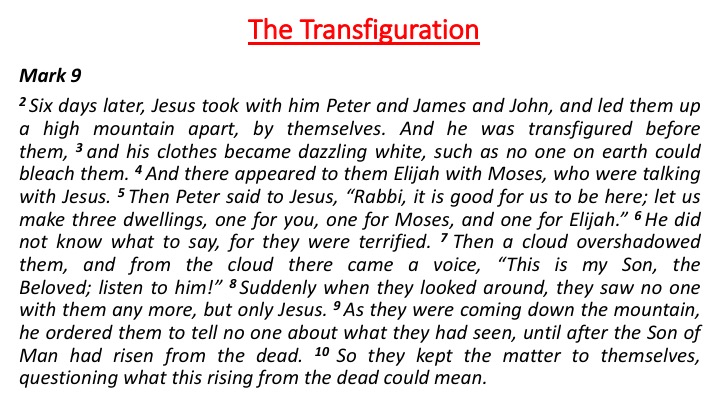
Jesus and the Gospels
The Transfiguration
Mark 9
2 Six days later, Jesus took with him Peter and James and John, and led them up a high mountain apart, by themselves. And he was transfigured before them, 3 and his clothes became dazzling white, such as no one on earth could bleach them. 4 And there appeared to them Elijah with Moses, who were talking with Jesus. 5 Then Peter said to Jesus, “Rabbi, it is good for us to be here; let us make three dwellings, one for you, one for Moses, and one for Elijah.” 6 He did not know what to say, for they were terrified. 7 Then a cloud overshadowed them, and from the cloud there came a voice, “This is my Son, the Beloved; listen to him!” 8 Suddenly when they looked around, they saw no one with them any more, but only Jesus. 9 As they were coming down the mountain, he ordered them to tell no one about what they had seen, until after the Son of Man had risen from the dead. 10 So they kept the matter to themselves, questioning what this rising from the dead could mean.
Again Peter's response is problematical. He wants to build three tents, one for Moses, one for Elijah, and one for Jesus. Seemingly thinking Jesus was only another emissary from God. But then God interrupts and states: "This is my Son, listen to him". Did Peter finally get it? Apparently not because Mark comments that they questioned among themselves what this rising from the dead could mean.
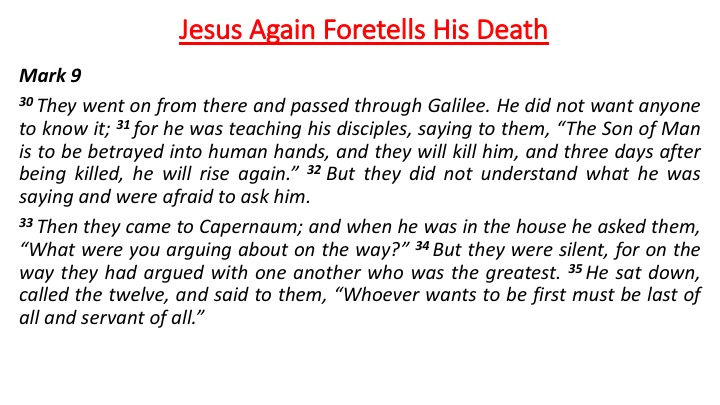
Jesus Again Foretells His Death
Mark 9
30 They went on from there and passed through Galilee. He did not want anyone to know it; 31 for he was teaching his disciples, saying to them, “The Son of Man is to be betrayed into human hands, and they will kill him, and three days after being killed, he will rise again.” 32 But they did not understand what he was saying and were afraid to ask him.
33 Then
they came to Capernaum; and when he was in the house he asked them, “What were
you arguing about on the way?” 34 But
they were silent, for on the way they had argued with one another who was the
greatest. 35 He
sat down, called the twelve, and said to them, “Whoever wants to be first must
be last of all and servant of all.”
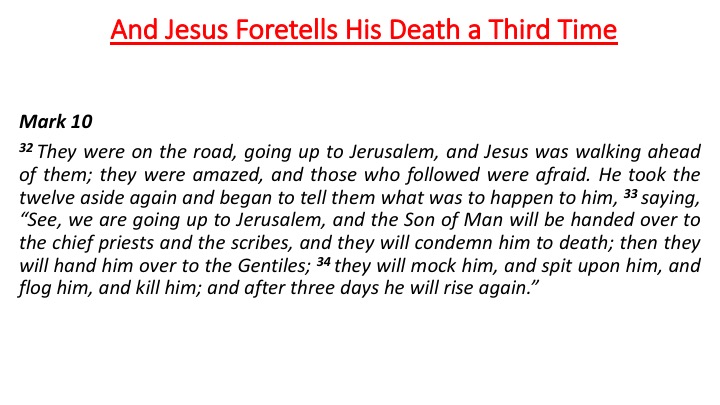
And Jesus Foretells His Death a Third Time
Mark 10
32 They were on the road, going up to Jerusalem, and Jesus was walking ahead of them; they were amazed, and those who followed were afraid. He took the twelve aside again and began to tell them what was to happen to him, 33 saying, “See, we are going up to Jerusalem, and the Son of Man will be handed over to the chief priests and the scribes, and they will condemn him to death; then they will hand him over to the Gentiles; 34 they will mock him, and spit upon him, and flog him, and kill him; and after three days he will rise again.”
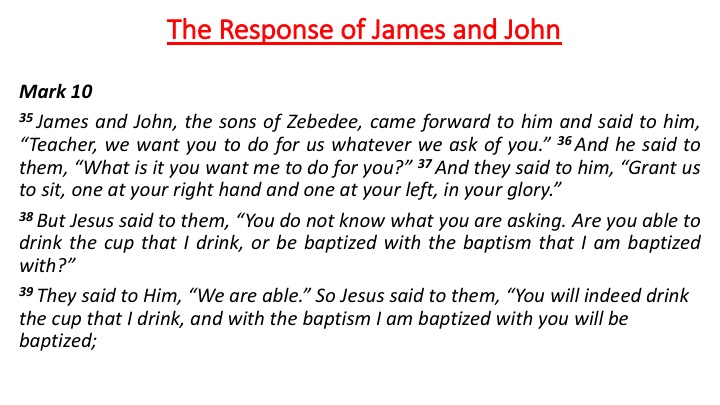
The Response of James and John
Mark 10
35 James
and John, the sons of Zebedee, came forward to him and said to him, “Teacher,
we want you to do for us whatever we ask of you.” 36 And
he said to them, “What is it you want me to do for you?” 37 And
they said to him, “Grant us to sit, one at your right hand and one at your
left, in your glory.” 38 But
Jesus said to them, “You do not know what you are asking. Are you able to drink
the cup that I drink, or be baptized with the baptism that I am baptized with?”
39 They
said to Him, “We are able.”
So Jesus said to them, “You will indeed drink the cup that I drink, and with the baptism I am baptized with you will be baptized;
And once again, these two disciples seemingly ignore Jesus's prediction that he will suffer horribly and die, be buried and then rise from the dead. Their interest is only in what piece of the action they will get after Jesus comes in his glory.
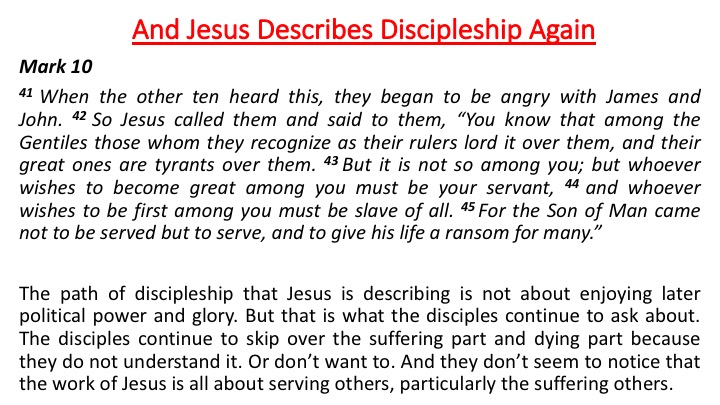
And Jesus Describes Discipleship Again
Mark 10
41 When the other ten heard this, they began to be angry with James and John. 42 So Jesus called them and said to them, “You know that among the Gentiles those whom they recognize as their rulers lord it over them, and their great ones are tyrants over them. 43 But it is not so among you; but whoever wishes to become great among you must be your servant, 44 and whoever wishes to be first among you must be slave of all. 45 For the Son of Man came not to be served but to serve, and to give his life a ransom for many.”
The path of discipleship that Jesus is describing is not about enjoying later political power and glory. But that is what the disciples continue to ask about. The disciples continue to skip over the suffering part and dying part because they do not understand it. Or don’t want to. And they don’t seem to notice that the work of Jesus is all about serving others, particularly the suffering others.
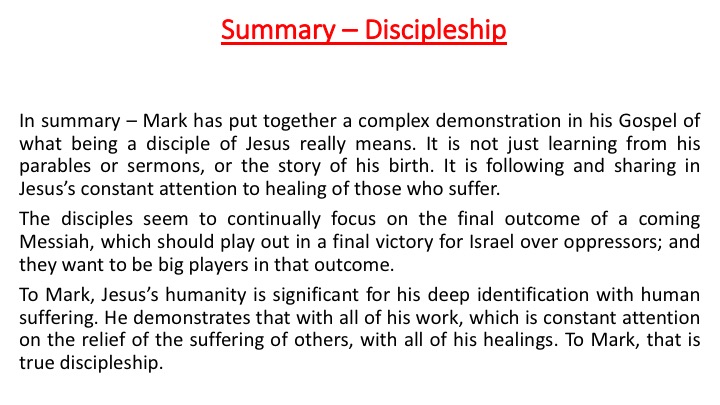
Summary – Discipleship
In summary – Mark has put together a complex demonstration in his Gospel of what being a disciple of Jesus really means. It is not just learning from his parables or sermons, or the story of his birth. It is following and sharing in Jesus’s constant attention to healing of those who suffer.
The disciples seem to continually focus on the final outcome of a coming Messiah, which should play out in a final victory for Israel over oppressors; and they want to be big players in that outcome.
To Mark, Jesus’s humanity is significant for his deep identification with human suffering. He demonstrates that with all of his work, which is constant attention on the relief of the suffering of others, with all of his healings. To Mark, that is true discipleship.
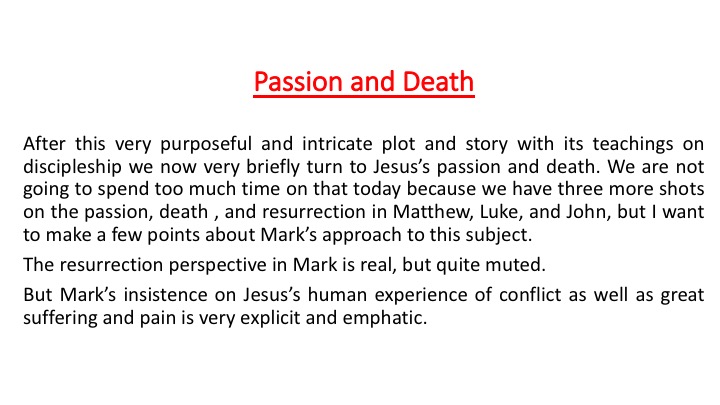
Passion and Death
After this very purposeful and intricate plot and story with its teachings on discipleship we now turn to Jesus’s Passion and Death. We are not going to spend too much time on that today because we have three more shots on the Passion, Death , and Resurrection in Matthew, Luke, and John, but I want to make a few points about Mark’s approach to this subject.
The resurrection perspective in Mark is real, but quite muted. Mark presents the resurrection by means of the three predictions of Jesus, all of which finish by saying that Jesus will rise from the grave after three days. But in the ending of Mark in chapter 16 there are no stories of what Jesus does after his resurrection. All those interesting things we know that Jesus did after his resurrection come in Matthew, Luke, and John. This is sometimes referred to as the mysterious ending of Mark.
But Mark’s insistence on Jesus’s human experience of conflict as well as great suffering and pain is very explicit and emphatic.
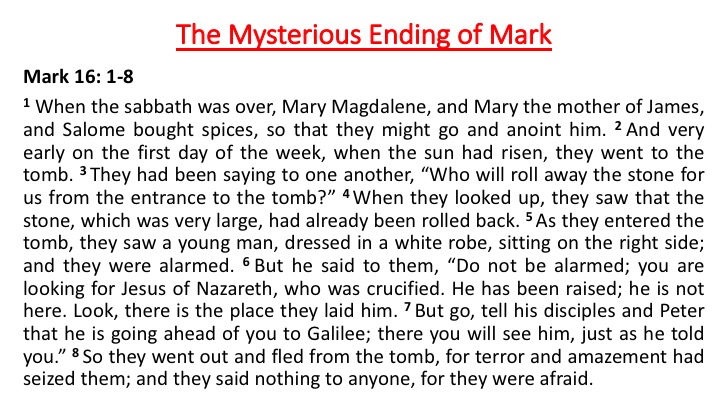
The Mysterious Ending of Mark
Mark 16: 1-8
1 When the sabbath was over, Mary Magdalene, and Mary the mother of James, and Salome bought spices, so that they might go and anoint him. 2 And very early on the first day of the week, when the sun had risen, they went to the tomb. 3 They had been saying to one another, “Who will roll away the stone for us from the entrance to the tomb?” 4 When they looked up, they saw that the stone, which was very large, had already been rolled back. 5 As they entered the tomb, they saw a young man, dressed in a white robe, sitting on the right side; and they were alarmed. 6 But he said to them, “Do not be alarmed; you are looking for Jesus of Nazareth, who was crucified. He has been raised; he is not here. Look, there is the place they laid him. 7 But go, tell his disciples and Peter that he is going ahead of you to Galilee; there you will see him, just as he told you.” 8 So they went out and fled from the tomb, for terror and amazement had seized them; and they said nothing to anyone, for they were afraid.
Note that the women were told to report what they found to the disciples, but were so afraid they never did. Why did Mark do that. We do not know.
However, this was addressed in the church tradition later, and if you read Mark 16 in your modern English bibles you will find it goes from verse 1 to verse 20. With the added verses being an amalgam of the resurrection accounts in Matthew and Luke. The added verses are usually shown in brackets, with a footnote that refers to verses 9-20 as the longer ending of Mark.
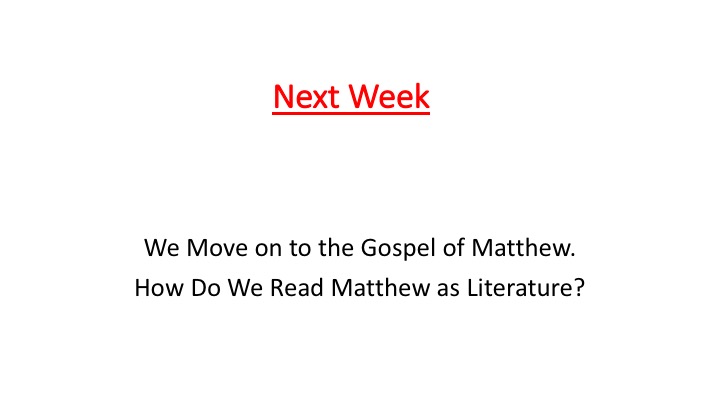
So be back next week as we tackle the book of Matthew.